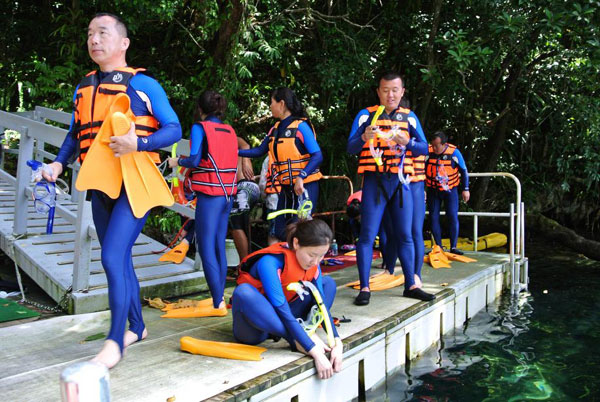Paradise lost
 |
|
Chinese tourists get ready to swim in the world-renowned "jellyfish lake".[Photo/Agencies] |
Chinese arrivals via Hong Kong and Macao soared to 50,000 since airlines started chartering flights in 2014 until this February, the website says.
Domestic travel agencies' Palau packages have burgeoned in pace.
"Most Chinese visit with tour groups because of language and service needs," explains Chinese-TV travel-channel producer Zhu Zi, who independently visited Palau with a friend on vacation in January.
More people from Guangzhou and comparable southern cities know the destination than travelers from such northern departure points as Beijing, Zhu says.
Online travel giant Ctrip launched its first Palau trips in 2013.
"We've seen rapid growth in the number of Chinese tourists to Palau since we started the route," Ctrip's tourism department marketing director Dai Yu says.
"The charter-flight reduction will protect natural resources and enhance travelers' experiences."
Zhu supports limiting Chinese sightseers.
"It's good to control tourism. Too many people will hurt the industry."
Li Min, a Chinese employee of Palau Vacation Hotel, which mostly caters to mainland tourists, has noticed last year's increase in visitors from her homeland and says February's festival spike is "no surprise".
"The chartered-flights cut is up in the air," she says.
"Heavyweights are talking to Palau's government about potential fallout."
Its popularity with Chinese largely hails from the fact mainlanders don't need visas.
"Anyplace without visa requirements gets lots of Chinese," Zhu says.
That impelled her decision, especially since she booked on impulse.
"I bought my (Palau) ticket in a hurry," she says.
"Beijing is too cold in winter. I wanted to go somewhere tropical. I thought about (China's) Sanya. But there are too many northern Chinese. It's too crowded."
She considered going to Thailand.
"But you need a visa," she says.
"We looked for the best hotels and didn't worry about prices. We cared more about better service."
She spent $6,000 on the seven-day trip but says weeklong visits average $4,000.
Palau Pacific Resort was the only place she could find on the beachfront.
Tuniu.com offers several five-day "DIY" trips from Hong Kong in April for less than 5,000 yuan ($815).
"Visitors can enjoy the jellyfish lake, an undersea fault line and more than 7,000 reefs," the online travel website's media officer Sun Libin says.
Dai says many Chinese come to explore the seabed. She and Zhu point out the waters ripple with seven hues.
"You can see through the clear water to the bottom," Dai says.
But locals complain some Chinese kill coral and jellyfish, and they litter.
While many mainlanders come to enjoy the natural environment, some behaviors and sheer numbers damage the ecosystem that supports the country's pillar industry.
Indignation ensued after Chinese travel agency Yellow Skin Tour circulated a brochure showing Chinese tourists dangling a wild sea turtle by its flippers, media report.
Zhu says most tourists she met hailed from Japan and Taiwan, Palau's traditional source front-runners.
"If a restaurant has five tables, maybe one will have Chinese," she says.
"It's more of a destination for young Chinese. A few hotels get a lot of Chinese because they offer Chinese-language services."
No locals she encountered spoke much Mandarin. And most information was in the traditional characters ubiquitous in Taiwan but scarcer on the mainland.
Despite Palau's efforts to curb visits to safeguard sustainability, profitability may prove more powerful.
The apprehension is lust for short-term earnings may lead to long-term-even permanent-destruction of natural attractions that conjure the archipelago's allure.




















